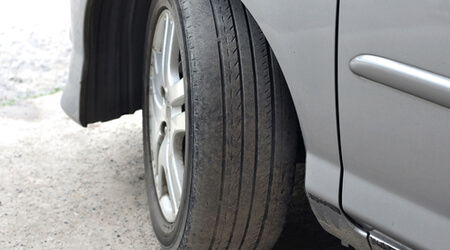
How Does the Age of a Tire Affect Safety?
Many drivers measure the wear and tear of the tires on their vehicle, but far fewer probably think about the age of the tires. No matter how much tread a tire has, an older tire can still put you and your passengers at risk of an accident. As a vehicle owner, you should know how age affects tires and what you can do to ensure that you are always driving on safe tires.
If you’ve been injured in a car accident caused by a tire failure, contact Joye Law Firm for a free case evaluation with one of our South Carolina personal injury attorneys. Call us today at 888-324-3100.
What Happens to a Tire as It Ages?
Over time, the rubber compounds in a tire begin to dry out, allowing cracks to form. These cracks may form on the surface of the tire or, more dangerously, within the rubber material where they are not visible. Cracking of tire rubber can cause the steel belts holding the tread to the tire to separate from the tire while the vehicle is moving. This can lead to a motorist losing control of the vehicle and getting into a serious accident.
How Long Does a Tire Last?
State and federal regulations do not put a limit on how long tires are supposed to last or recommend when vehicle owners should replace tires. However, most vehicle manufacturers recommend that tires be replaced no later than six years after being manufactured. Some tire manufacturers state that their tires can last up to 10 years, but they still recommend an annual inspection of tires after the fifth year following manufacture.
The effective life of a tire will depend on the particular model. Environmental and weather factors, how the tire is stored, and whether a tire is properly inflated on a wheel can also affect the life of a tire.
How to Determine the Age of a Tire
Since 2000, the National Highway Traffic Safety Administration has required that tires be marked with a Tire Identification Number. This number, which begins with the letters “DOT,” contains eight to 13 letters and numbers. It identifies the manufacturer of the tire, where the tire was manufactured, the size and model of the tire, and the week and year that the tire was manufactured.
The last four digits of the Tire Identification Number, which is located on the sidewall of a tire, tells you when the tire was manufactured. The first two digits designate the week of the year, and the second two digits designate the calendar year. For example, if the last four digits of a Tire Identification Number read “3416,” then the tire was manufactured in the 34th week of 2016.
Tires manufactured before 2000 have a slightly different Tire Identification Number system, as tires were not designed to have the ability to remain in service for longer than 10 years. The date of manufacture was coded into the last three digits of the Tire Identification Number. The first two of those digits also represented the week of the year the tire was manufactured, but the third digit represented the year of the decade the tire was manufactured in.
Of course, if you were looking at a tire in 1992 with a “1” as the final digit in the Tire Identification Number, you may have had no way to confirm if the tire was manufactured in 1991 or 1981. However, these days, if a vehicle has tires manufactured prior to 2000, they should obviously be immediately replaced.
Many tires only have the Tire Identification Number molded onto one side. So when having new tires mounted onto your wheels, keep the visibility of the Tire Identification Number in mind. You may want to ask the tire shop to record the number for you so you can avoid having to later jack up your car if the tire is mounted with the number facing inward.
Also, you should keep the purchase receipt for your tires. Most tire manufacturers offer warranties that last four years from the date of purchase. However, if you don’t have proof of the date of your purchase, the warranty becomes five years from the week of the tire’s manufacture. If you throw out or lose your receipt, you may end up losing out on a couple of months or potentially even a couple of years of warranty coverage for your tires.
Why You Should Not Buy Used Tires
Some vehicle owners may consider purchasing used tires for their vehicle to save costs, especially if they are buying tires for a vehicle that is not frequently driven. However, even if a used tire has a great deal of tread remaining, you may be purchasing tires that are only a few years or even a few months away from a catastrophic failure.
In addition, with used tires, you have no way of knowing how the tires were stored or used. Exposure to extreme heat or cold, underinflation, rough use, or patching can significantly shorten the safe life of a tire. Although the Tire Identification Number may show that a tire is only a couple of years old, the way the tire has been used may mean that it would be unsafe to continue using it on a vehicle.
Make Sure You’re Getting “Fresh” Tires
Even when you think you are buying “new” tires at an auto shop, you may, in fact, be getting tires that are months or years old. You may decide to purchase a model of tire that the auto shop doesn’t sell frequently. As a result, the tires may have been sitting in the shop for a long time before they are mounted on your vehicle. Unscrupulous tire shops may even buy older “new” tires off of other auto shops that don’t end up selling them, turning around and selling them to unsuspecting customers for a greater profit.
If you buy new tires that were manufactured years prior, you may be losing several years of effective life from the tire. In addition, you may also be losing out on important warranty coverage. Tire manufacturers usually offer warranty periods of four to five years from the date of manufacturer. Buying tires that have been sitting around for a couple of years may mean you will soon be riding on tires that no longer have warranty coverage.
Ideally, you should ask to inspect the tires you are purchasing before they are fitted to your vehicle’s wheels so that you can check the manufacture date. If the tires are a couple of years old, you should request that the shop fit newer tires instead.
When buying a new set of tires, you may receive four tires with four different manufacture dates. If any of the tires being fitted to your vehicle is older than a year, or if there is a significant gap in the age between two tires, you should request newer tires. Once one of the tires on your car reaches an age at which it should be replaced, you will need to replace all four tires even if you have a year or more left on the other tires on your vehicle.
How Old Tires Can Be Dangerous
It can seem counterintuitive to replace tires that appear to be in good condition. However, if tires are more than five or six years old, vehicle owners should be preparing to purchase a new set.
Old tires can suffer catastrophic failure while a vehicle is moving due to the breakdown and cracking of the rubber compounds in the tire. One of the most common ways for old tires to fail involves the tread portion of the tire coming loose or separating from the tire structure, which can easily send a vehicle out of control. Cracking of the rubber compounds can also result in a blowout on the road.
Even if an old tire doesn’t suffer a catastrophic failure, it can still pose a danger to motorists. Tires have the greatest effect on a vehicle’s handling and braking capabilities. When tires get old, drivers are more at risk of losing control of their vehicle, particularly in low traction conditions such as snow, ice, or heavy rain. Old tires may also result in the car having a longer stopping distance, especially when attempting to make an emergency stop.
Contact Joy Law Firm Today
If you’ve been involved in a car accident, contact the South Carolina personal injury lawyers at Joye Law Firm. Give us a call at 888-324-3100 for a free, no-obligation consultation to discuss your rights and learn how our firm can help you pursue compensation for your losses. We have four conveniently located offices across the state in Charleston, Myrtle Beach, Columbia, and Clinton to best serve you.



























